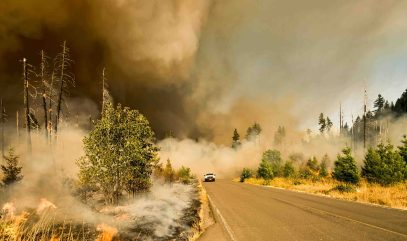Covid-19 is an Environmental Problem. Here’s Why
Medical professionals started noticing a strange virus after witnessing 41 cases of pneumonia, of which two-thirds were workers or customers at the Huanan market in Wuhan, China. The Huanan market is a wet market, meaning that it facilitates the sale of wild animals. These animals are kept in small cages and stacked on one another, creating the perfect conditions for a germ-spreading factory.
It’s easy to condemn China for this practice. After all, we would never take part in something so risky (except for close-quartered cattle ranching that provides about 99 percent of American meat, slaughterhouses, and many other large-scale industrial farming methods).
What’s more difficult to accept is that not only was Covid-19 not China’s fault, it was all of our faults. In many ways, as humans created it.
The good news is that we can also protect ourselves from pandemics like Covid-19, but only if we realize that the health of the ecosystems around us is just as important as our own health.
Covid-19 is a zoonotic disease, meaning that it first originated from animals and then mutated to affect humans. Many other illnesses originate from animals. SARS came from bats, MERS from camels, and HIV/AIDS from chimpanzees. Even the common flu comes from birds or pigs. Every species holds countless microbes that are harmless to the species, since it has evolved and adapted to each germ. When the virus enters another species, that’s when a pandemic can begin.
It’s getting more common too. Estimates say that “outbreaks of newly emerging zoonotic diseases are occurring about two to three times more frequently per decade than in the 1940s.” What could have caused this increase? Human behavior: cutting down forests, global trade, and industrialization.
“The building of dams, factory farms, and irrigation installations have been associated with up to 50 percent of all infectious diseases transmitted from animals to humans since 1940,” according to the Food and Agriculture Organization of the United Nations. The degradation of forests is one of humanity’s most harmful behaviors. When people cut down and move into what used to be forest habitat, they reduce the livable habitat for wild animals, live in closer proximity, and expose themselves to animal excretions. These excretions can spread deadly germs that the human body hasn’t been exposed to before.
If we want to prevent a pandemic like Covid-19 from happening again, we need to prevent forest degradation and other practices that destroy animal habitat. As B Corps, it means that we need to stand firmly in our belief that the environment matters. Make sure that you and your suppliers are responsibly managing land and are either maintaining or improving forest health. Recognize and respect the rights of Indigenous Peoples, who have immense power to restore ecology built on a long history of respecting and caring for the environment. Take care of biodiversity and recognize the importance of each creature to all habitats.
The health of our communities is only as strong as our ecosystem. And the health of our businesses and economy are only as strong communities. When we treat our environment and animals poorly, there is a direct impact on our individual and collective health. When we neglect our communities by undervaluing people and underpaying employees, we put everyone at risk. When we fail to understand and accept our role in spreading disease, we increase the risk of future pandemics. Only when we recognize the interdependencies of our world can we change the security of our own health, and the world around us, for the better.
Read More
The 1980s Called and They Want Their Business Case Back: Why we're rejecting the "business case" for sustainability
They say a rising tide raises all boats. But there isn’t any raising to be done when the tide no longer comes into the bay – all boats remain stranded. We are often asked about the business case for sustainability. For y
Protect Your Community or Organization with a Climate Action Plan
Introduction Our changing climate impacts every aspect of our lives—our economy, our communities, and the environment—in ways both visible and unseen. While scientists and environmental organizations have long recognized
Witnessing the world of sustainable business firsthand
As a young student with a passion for climate justice and sustainability, it always felt like a contradiction to pursue a degree in business. From what I had witnessed, businesses didn’t necessarily operate ethically. Mu
Interning with Purpose: My Journey with Measure Meant
From January to May 2024, I had the distinct pleasure of working with Measure Meant as an Operations Intern. As a graduating senior at Gonzaga University, I had not planned on pursuing another internship in my final seme




